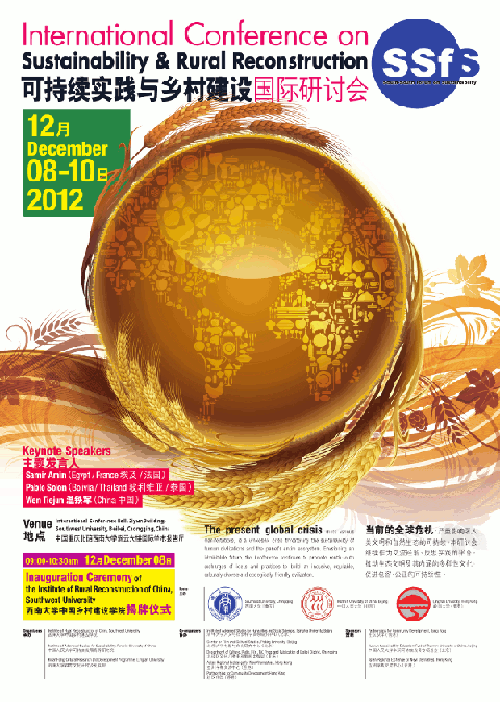Event Title
2012 可持續實踐與鄉村建設國際研討會
Start Date
10-12-2012 10:15 AM
End Date
10-12-2012 11:15 AM
Language
Putonghua
Description
跳出生态看生态——以中国当代乡村建设实践为例 (潘家恩)
日益“时尚化”的生态议题绝不是少数人制造出来的末日预言,它是真实发生在我们身边的普遍现实,同时也是当代乡村建设的重要工作内容与面向,更是乡村建设结合其它工作进行深入思考的独特角度。所以,乡村建设必须直接回应生态与可持续议题,但需要结合以更广阔的整体视野。本文结合笔者所参与的三组当代乡村建设实际案例展开分析,希望将其放回具体和历史的脉络中,结合以经济、文化、政治等多种面向,尝试指出:生态有问题,不只是生态问题!乡村生态的改善之道自然不可就事论事。
As opposed to being an apocalyptic prophecy advocated by a small group of people, the increasingly “fashionable” ecological issues are not only popular realities happening in our daily life, but also important tasks and aspects of Contemporary Rural Reconstruction and a unique perspective for reflection in amalgamating discussions in Rural Reconstruction with other related tasks and disciplines. Therefore Rural Reconstruction must respond directly to the issues of Ecology and Sustainability but in doing so, requires the incorporation of a broader and more integrative and holistic vision. This paper analyses three of the case studies of Contemporary Rural Reconstruction that the author had taken part in, in order to situate them in their broader concrete historical context together with diversified perspectives—economic, cultural and political for instance, in the attempt to point out: Problems found with Ecological matters are more than just “ecological problems”! Discussions in relation to Rural-ecological Improvement cannot be limited to the problems of its own.
新乡村建设 (严晓辉)
新世纪之初,伴随随着中国工业的扩张和现代化进程的加速,农村生产要素逐渐外流,以传统农耕生活建构起来的乡村文明逐渐衰败,“三农问题”日益凸显。
自绿色革命以来的,以破坏环境,浪费资源为代价的农业生产方式在全球推广,农产品也逐渐被纳入全球化贸易体系当中,并且按照单一产量和一般劳动生产率计算农产品的生产成本,小农户生存艰难,渐渐脱离土地;于此同时,工业产品进入农村,传统手工业同样因为效率低下和成本过高而逐渐衰落。因从土地和手工作坊里“解放”出来的大量农村劳动力进入城市,加速推动城市化的发展,造成“城市包围农村”的恶性循环,也造成了就业、养老和社会保障等新问题。
为了走出现代化的发展逻辑,开掘中国传统的乡村文明,以新乡村建设为目标的新世纪年轻人掀起了又一轮“上山下乡”运动。
At the dawn of the new century, as the industry expands and the process of modernization accelerates in China, the essential ingredients in village production gradually outflow. This phenomenon has resulted in the destruction of traditional agricultural life, which is fundamental to rural civilization. With the decline of rural civilization, increasing attention has been aroused to the Three Rural Issues.
Since the Green Revolution, the mode of agricultural production satisfying the natural environment and resources has been promoted all over the world. Agricultural products started to be included in the globalized trading system, which imposes its own formula of production costs (which assumes mass production of a single product) based on general labor productivity. Compelled by the difficult environment for survival, more farmers with small land-holding have been severed from their land. At the same time, mass-manufactured goods besieged rural villages, ousting the traditional hand-crafted goods which were no match of such products in terms of efficiency of production and production costs. The labour which was “liberated” from their land and handicraft workshops moved into cities, speeding up urbanization, which results in the vicious cycle of “city surrounded by village” with new problems of employment, social security and sustenance of the elderly.
To find a way out of modernization’s rules of operation and rediscover traditional rural civilization, the young people of this century has started another round of “up the mountains, down the countryside” movement with the goal of building the “new” village.
Document Type
Conference
Presentation Material
Recommended Citation
潘家恩、严晓辉 (2012,12月)。当代乡村建设的实践与反思。發表於 2012可持續實踐與鄉村建設國際研討會,西南大学,中國重慶市。
Included in
Demography, Population, and Ecology Commons, Growth and Development Commons, Other International and Area Studies Commons, Place and Environment Commons, Sociology of Culture Commons
当代乡村建设的实践与反思
跳出生态看生态——以中国当代乡村建设实践为例 (潘家恩)
日益“时尚化”的生态议题绝不是少数人制造出来的末日预言,它是真实发生在我们身边的普遍现实,同时也是当代乡村建设的重要工作内容与面向,更是乡村建设结合其它工作进行深入思考的独特角度。所以,乡村建设必须直接回应生态与可持续议题,但需要结合以更广阔的整体视野。本文结合笔者所参与的三组当代乡村建设实际案例展开分析,希望将其放回具体和历史的脉络中,结合以经济、文化、政治等多种面向,尝试指出:生态有问题,不只是生态问题!乡村生态的改善之道自然不可就事论事。
As opposed to being an apocalyptic prophecy advocated by a small group of people, the increasingly “fashionable” ecological issues are not only popular realities happening in our daily life, but also important tasks and aspects of Contemporary Rural Reconstruction and a unique perspective for reflection in amalgamating discussions in Rural Reconstruction with other related tasks and disciplines. Therefore Rural Reconstruction must respond directly to the issues of Ecology and Sustainability but in doing so, requires the incorporation of a broader and more integrative and holistic vision. This paper analyses three of the case studies of Contemporary Rural Reconstruction that the author had taken part in, in order to situate them in their broader concrete historical context together with diversified perspectives—economic, cultural and political for instance, in the attempt to point out: Problems found with Ecological matters are more than just “ecological problems”! Discussions in relation to Rural-ecological Improvement cannot be limited to the problems of its own.
新乡村建设 (严晓辉)
新世纪之初,伴随随着中国工业的扩张和现代化进程的加速,农村生产要素逐渐外流,以传统农耕生活建构起来的乡村文明逐渐衰败,“三农问题”日益凸显。
自绿色革命以来的,以破坏环境,浪费资源为代价的农业生产方式在全球推广,农产品也逐渐被纳入全球化贸易体系当中,并且按照单一产量和一般劳动生产率计算农产品的生产成本,小农户生存艰难,渐渐脱离土地;于此同时,工业产品进入农村,传统手工业同样因为效率低下和成本过高而逐渐衰落。因从土地和手工作坊里“解放”出来的大量农村劳动力进入城市,加速推动城市化的发展,造成“城市包围农村”的恶性循环,也造成了就业、养老和社会保障等新问题。
为了走出现代化的发展逻辑,开掘中国传统的乡村文明,以新乡村建设为目标的新世纪年轻人掀起了又一轮“上山下乡”运动。
At the dawn of the new century, as the industry expands and the process of modernization accelerates in China, the essential ingredients in village production gradually outflow. This phenomenon has resulted in the destruction of traditional agricultural life, which is fundamental to rural civilization. With the decline of rural civilization, increasing attention has been aroused to the Three Rural Issues.
Since the Green Revolution, the mode of agricultural production satisfying the natural environment and resources has been promoted all over the world. Agricultural products started to be included in the globalized trading system, which imposes its own formula of production costs (which assumes mass production of a single product) based on general labor productivity. Compelled by the difficult environment for survival, more farmers with small land-holding have been severed from their land. At the same time, mass-manufactured goods besieged rural villages, ousting the traditional hand-crafted goods which were no match of such products in terms of efficiency of production and production costs. The labour which was “liberated” from their land and handicraft workshops moved into cities, speeding up urbanization, which results in the vicious cycle of “city surrounded by village” with new problems of employment, social security and sustenance of the elderly.
To find a way out of modernization’s rules of operation and rediscover traditional rural civilization, the young people of this century has started another round of “up the mountains, down the countryside” movement with the goal of building the “new” village.
